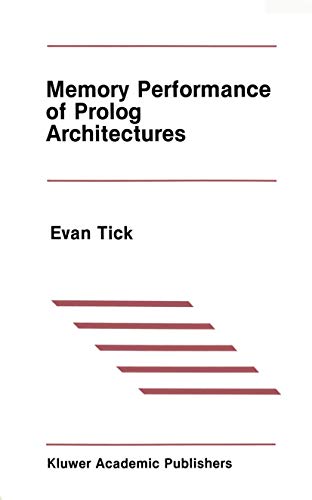Artículos relacionados a Memory Performance of Prolog Architectures: 40 (The...
Memory Performance of Prolog Architectures: 40 (The Springer International Series in Engineering and Computer Science) - Tapa blanda

"Sobre este título" puede pertenecer a otra edición de este libro.
- EditorialSpringer
- Año de publicación2013
- ISBN 10 1461292026
- ISBN 13 9781461292029
- EncuadernaciónTapa blanda
- Número de páginas256
Comprar nuevo
Ver este artículo
Gastos de envío:
GRATIS
A Estados Unidos de America
Los mejores resultados en AbeBooks
Memory Performance of Prolog Architectures (The Springer International Series in Engineering and Computer Science) by Tick, Evan [Paperback ]
Descripción Soft Cover. Condición: new. Nº de ref. del artículo: 9781461292029
Memory Performance of Prolog Architectures
Descripción Condición: New. PRINT ON DEMAND Book; New; Fast Shipping from the UK. No. book. Nº de ref. del artículo: ria9781461292029_lsuk
Memory Performance of Prolog Architectures (The Springer International Series in Engineering and Computer Science, 40)
Descripción Condición: New. Nº de ref. del artículo: ABLIING23Mar2716030030378
Memory Performance of Prolog Architectures
Descripción Condición: New. Dieser Artikel ist ein Print on Demand Artikel und wird nach Ihrer Bestellung fuer Sie gedruckt. One suspects that the people who use computers for their livelihood are growing more sophisticated as the field of computer science evolves. This view might be defended by the expanding use of languages such as C and Lisp in contrast to the languages such. Nº de ref. del artículo: 4191731
Memory Performance of Prolog Architectures
Descripción Taschenbuch. Condición: Neu. Druck auf Anfrage Neuware - Printed after ordering - One suspects that the people who use computers for their livelihood are growing more 'sophisticated' as the field of computer science evolves. This view might be defended by the expanding use of languages such as C and Lisp in contrast to the languages such as FORTRAN and COBOL. This hypothesis is false however - computer languages are not like natural languages where successive generations stick with the language of their ancestors. Computer programmers do not grow more sophisticated - programmers simply take the time to muddle through the increasingly complex language semantics in an attempt to write useful programs. Of course, these programmers are 'sophisticated' in the same sense as are hackers of MockLisp, PostScript, and Tex - highly specialized and tedious languages. It is quite frustrating how this myth of sophistication is propagated by some industries, universities, and government agencies. When I was an undergraduate at MIT, I distinctly remember the convoluted questions on exams concerning dynamic scoping in Lisp - the emphasis was placed solely on a 'hacker's' view of computation, i. e. , the control and manipulation of storage cells. No consideration was given to the logical structure of programs. Within the past five years, Ada and Common Lisp have become programming language standards, despite their complexity (note that dynamic scoping was dropped even from Common Lisp). Of course, most industries' selection of programming languages are primarily driven by the requirement for compatibility (with previous software) and performance. Nº de ref. del artículo: 9781461292029
Memory Performance of Prolog Architectures
Descripción Taschenbuch. Condición: Neu. This item is printed on demand - it takes 3-4 days longer - Neuware -One suspects that the people who use computers for their livelihood are growing more 'sophisticated' as the field of computer science evolves. This view might be defended by the expanding use of languages such as C and Lisp in contrast to the languages such as FORTRAN and COBOL. This hypothesis is false however - computer languages are not like natural languages where successive generations stick with the language of their ancestors. Computer programmers do not grow more sophisticated - programmers simply take the time to muddle through the increasingly complex language semantics in an attempt to write useful programs. Of course, these programmers are 'sophisticated' in the same sense as are hackers of MockLisp, PostScript, and Tex - highly specialized and tedious languages. It is quite frustrating how this myth of sophistication is propagated by some industries, universities, and government agencies. When I was an undergraduate at MIT, I distinctly remember the convoluted questions on exams concerning dynamic scoping in Lisp - the emphasis was placed solely on a 'hacker's' view of computation, i. e. , the control and manipulation of storage cells. No consideration was given to the logical structure of programs. Within the past five years, Ada and Common Lisp have become programming language standards, despite their complexity (note that dynamic scoping was dropped even from Common Lisp). Of course, most industries' selection of programming languages are primarily driven by the requirement for compatibility (with previous software) and performance. 256 pp. Englisch. Nº de ref. del artículo: 9781461292029

